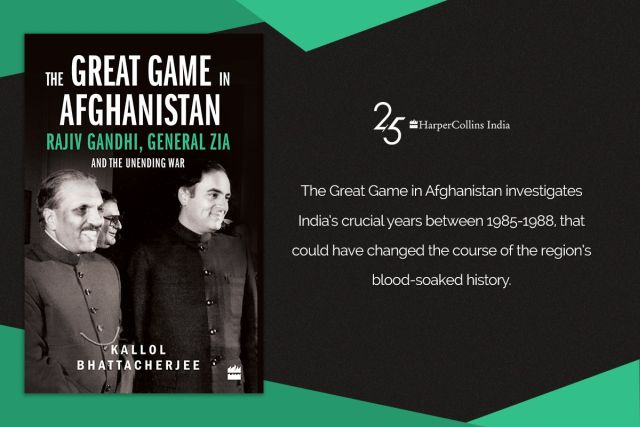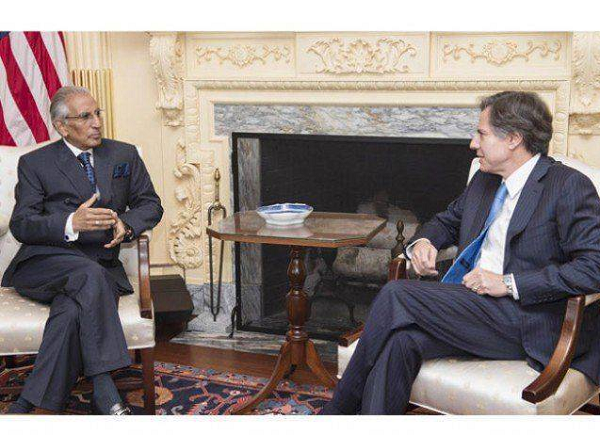
by admin | May 25, 2021 | Books
 By Vikas Datta,
By Vikas Datta,
Title: The Great Game in Afghanistan – Rajiv Gandhi, General Zia and the Unending War; Author: Kallol Bhattacherjee; Publisher: Harper Collins; Pages: 328; Price: Rs 599
Donald Trump has become the third US President to send more troops to Afghanistan, in what has become his country’s longest-ever war — with no signs of any closure yet. But the Americans, who had a big part in launching the nearly four-decade-long crisis, also did forgo a chance of a settlement in its very first decade itself. By miffing India.
The list of the mistakes that the Americans committed in Afghanistan after deciding to oppose the Soviet invasion is long. We know too well how their fervent urge to defeat their ideological adversary made them oblivious to the means they chose to employ – – until their instruments became their own implacable enemy. Then, they failed to exert any meaningful influence over their chosen regional ally, who frequently played false with them, and always ignored its indiscretions.
But how the US spurned a natural partner after trying to involve it to reach a solution is a story not many outside a small circle of high political and diplomatic movers and shakers of the 1980s may know — and it is this that Kallol Bhattacharjee tells here.
Noting that while it is the hyphenated “Af-Pak” perspective that has gained ground, especially after 9/11, he says zeroing in on only Pakistan to explain Afghanistan’s predicament is not enough. And in this book, he seeks to offer “a counter-narrative of the narrow Af-Pak project to show that the focus of the crisis was much broader”.
“Diplomats who worked during these difficult years told me that the story of Afghanistan of the 1980s cannot be complete without going into how the United States, India and Pakistan worked on a peace plan and how the plan failed to take off due to differences between the stakeholders,” says Bhattacharjee, a journalist with extensive experience of South and West Asian affairs and conflicts.
Though there was a rather different configuration of allies and adversaries, it was a “Great Game” all over again, and India, under Rajiv Gandhi, was bound to be involved given the threat from a huge influx of weapons and radicalism to the region.
And India did try to use its good offices, but saw its efforts go nowhere — and got victimised in the bargain.
Beginning with a watershed event — the accident that killed Pakistan President Zia ul Haq in 1988 — he goes back and forth in time with his three principal protagonists: Zia, Rajiv Gandhi and then US Ambassador to India John Gunther Dean (whose career was ended shamefully when he questioned the official version of the crash) to narrate how this turbulent, “lost” decade not only squandered a chance to end one of the most destructive and destabilising conflicts ever, but also delayed a new global partnership.
Drawing from the papers of Dean — and in the process, rehabilitating his memory and contribution — and supplemented by interactions with key players like Indian diplomat Ronen Sen, then a key member of Gandhi’s office, and then Pakistani envoy to US Jamsheed Marker and others, Bhattacharjee not only offers a new look at the dynamics of the Afghan issue, but also the generational transformation of Indian politics and diplomacy in the Rajiv Gandhi years.
There is, alongside, the strong thread of how the prevailing toxic mistrust between India and Pakistan — even before the Kashmir issue came centrestage — prevented them from having normal relations, and how it would affect the destiny of the region itself — an impact which lingers on till now.
Bhattacharjee shows how this also cast a malefic influence on a promising new start between the world’s largest and oldest democracies, despite the positive chemistry between the top leaders.
While there are some problems — why Dean suspected Israel of killing Zia is never made clear, the language is sometimes clunky (too many ‘buts’ in a paragraph) and some factual errors (Pervez Musharraf could have never honoured Marker in 2011) — Bhattacharjee has created a spell-binding tale of missed opportunities, misplaced priorities, and Machiavellian gambits that no student of regional affairs can miss.
(Vikas Datta can be contacted at vikas.d@ians.in)
—IANS

by admin | May 25, 2021 | Business, Large Enterprise, Markets, Networking, Online Marketing, Social Media, Technology
 New York : Photo-sharing app Snapchat is expected to overtake Facebook for the first time in the US, as the user growth of Facebook will slow among teens and adults, market research firm eMarketer has said.
New York : Photo-sharing app Snapchat is expected to overtake Facebook for the first time in the US, as the user growth of Facebook will slow among teens and adults, market research firm eMarketer has said.
Snapchat is forecast to overtake both Instagram and Facebook in terms of total users aged 12 to 17 and 18 to 24 for the first time in 2017, that will shoot up Snapchat’s share of US social network users to 40.8 per cent.
The decline in user growth will also impact Facebook’s ad revenues as the company tries to make the platform an attractive destination for the advertisers by boasting about its young users.
Facebook reported nearly $9.2 billion in ad revenue in the second quarter of 2017, a rise of 47 per cent from the same period last year.
“We see teens and tweens migrating to Snapchat and Instagram. Both platforms have found success with this demographic since they are more aligned with how they communicate-that is, using visual content.
“Outside of those who have already left, teens and tweens remaining on Facebook seem to be less engaged-logging in less frequently and spending less time on the platform,” said Oscar Orozco, a senior forecasting analyst at eMarketer.
According to the market research firm, Facebook’s loss of monthly users between the ages of 12 and 17 will accelerate to 3.4 per cent this year compared to a 1.2 per cent drop in 2016.
eMarketer also predicted that Facebook-owned Instagram is expected to post growth of 23.8 per cent this year. Its monthly users under 12 years age are also expected to increase 19 per cent, and those in the age group of 12-to-17 to 8.8 per cent.
—IANS

by admin | May 25, 2021 | Muslim World
 Aleppo (IINA) : Syria’s main opposition group has recently said it doesn’t think Russia and the U.S will succeed in reviving a ceasefire to pave the way for a political transition amid a Russian-backed siege of 300,000 people in the rebel-held part of the former commercial capital Aleppo, Bloomberg reported.
Aleppo (IINA) : Syria’s main opposition group has recently said it doesn’t think Russia and the U.S will succeed in reviving a ceasefire to pave the way for a political transition amid a Russian-backed siege of 300,000 people in the rebel-held part of the former commercial capital Aleppo, Bloomberg reported.
“Restoring the cessation of hostilities has failed miserably so far. What we need is for Russia to restate that it is interested in a political process. We only see the opposite”, Bassma Kodmani, a senior member of the High Negotiations Committee, said during a conference call with reporters.
“The encirclement of civilian populations, the punishment we are seeing in Aleppo and the fact that Russia is participating in all of this is really putting a question mark on Geneva”, Kodmani said, referring to peace talks in the Swiss city that have been suspended since April.
The U.S and Russia on Friday agreed to “concrete steps” to rescue a sputtering ceasefire in Syria and revive the peace process after two days of talks by U.S Secretary of State John Kerry in Moscow. The goal of the agreement is to stop indiscriminate bombing by the Russian-backed forces of Syrian President Bashar al-Assad, as well as step up the fight against the Nusra Front, an al-Qaeda-affiliated rebel group in Syria, Kerry said.
The almost 6-year civil war has killed more than 280,000 people and sent millions fleeing to neighboring countries and Europe. It has also allowed ISIS to seize territory that is being used as a base to direct and inspire terror attacks worldwide.
While a partial “cessation of hostilities” took effect in late February, that agreement quickly broke down, and broader talks in Geneva over a political solution to the crisis stalemated.

by admin | May 25, 2021 | Muslim World

US State Department’s Special Representative to Muslim Communities Shaarik H. Zafar (Getty image)
Kuala Lumpur (IINA) – US State Department’s Special Representative to Muslim Communities Shaarik H. Zafar said that a ban on Muslims entering the United States as proposed by presumptive Republican presidential nominee Donald Trump is not possible under the US Constitution and American legal structure, The Straits Times reported.
Zafar said everywhere he travelled, he was asked about the possibility of such a ban being imposed.
Making use of a visit here to send a clear message to Muslims in Malaysia and other parts of the world, he said: “The US welcomes visitors from Malaysia and every part of the world. We will never, ever, ban any traveler based on religion or ethnicity. That’s simply not within our legal structure.”
The 41-year-old, who assumed his post two years ago, is responsible for driving the US Secretary of State’s policy of engagement with the global Muslim community.
Trump had, after a deadly mass shooting in San Bernardino, California, by suspected sympathizers of the Islamic State in Iraq and Syria (ISIS) last December, called for a total and complete shutdown of Muslims entering the US. His remarks sparked an outrage in the Muslim world.
In an interview here on Friday, Zafar explained: “The American Constitution and legal system is crystal clear that it is absolutely illegal to create bans based on religion, gender or national identity.”
“For travelers from Malaysia and all over the world, the US is open for business and will remain so.”
On hate speech and hate crimes against Muslims in the US, he said the US government was concerned about the rising intolerance.
Zafar said one of his previous jobs was as a lawyer handling cases of discrimination and hatred after the Sept 11 terror attacks in the US. “After 9/11, we had a rise in hate crimes against Arabs, South Asians and Middle Easterners.
Zafar has been to Malaysia twice in his current job where he was involved in various joint US-Malaysia programs.
He cited a program at Universiti Islam Antarabangsa where a group of students were on a project to help counter violent extremist narratives. Another project which his office funds is an entrepreneurship program at Universiti Malaysia Kelantan.
“What strikes me about Malaysia is what an incredibly diverse country this is, and like in the US, this diversity is a national asset,” Zafar said.

by admin | May 25, 2021 | Muslim World

Tariq Fatemi in a meeting US ambassador David Hale. PHOTO: FILE
ISLAMABAD, (IANS): Pakistan on Monday summoned the US ambassador to the foreign ministry and protested over the Saturday drone strike in southwest of the country, that killed Taliban chief Mullaha Akhtar Mansoor.
The US envoy David Hale was called in by Special Assistant to the Prime Minister on Foreign Affairs Syed Tariq Fatemi to express concern over the drone strike on Pakistani territory on Saturday, a statement released by Pakistan’s foreign ministry said.
“Fatemi pointed out that the drone strike was a violation of Pakistan’s sovereignty and a breach of the United Nation’s Charter that guarantees the inviolability of the territorial integrity of its member states,” said the statement.
The special assistant also emphasized that such actions could adversely impact the ongoing efforts by the Quadrilateral Coordination Group for facilitating peace talks between the Afghan Government and the Taliban.
Talking about the coordination on terrorism between the two countries, Fatemi also underlined that Pakistan and the US had been closely coordinating in the fight against the menace of terrorism and that this cooperation needed to be maintained.
Afghan Taliban leader Mullah Akhtar Mansoor was killed in the drone strike on his vehicle in a small town Ahmad Wal in Nushki district of Pakistan’s south-west province of Balochistan, which borders Afghanistan.
US President Barack Obama confirmed the killing.
“We have removed the leader of an organization that has continued to plot against and unleash attacks on American and coalition forces, to wage war against the Afghan people, and align itself with extremist groups like Al Qaeda,” said Obama in a statement.





